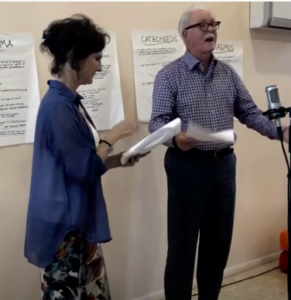
John Lithgow and Susan Angelo read a translation of “Abattis et eruditae,” a colloquy written to teach Elizabethan schoolboys conversational Latin
It was in my favorite biography of Shakespeare, Jonathan Bate’s “Soul of the Age,” that I first read about the use of colloquies to teach Latin conversation in Elizabethan schools. He mentioned that those by Desiderius Erasmus were especially popular, and he noted that they were funny.
I looked on the Internet and found a couple of old translations. I ordered them both, and eventually they arrived—dusty old books, falling apart with age. I read them, and wow! They were hilarious! To me they were clearly the source of so many of Shakespeare’s clowns, gossips, bar flies, corrupt clerics, comical town folk, and, especially, his sassy women! These were the colloquials who were my favorite characters in the plays I saw growing up. Had nobody else ever noticed that they came from Erasmus!?
Colloquies were short, scripted conversations, like little plays, to be performed by school children to practice conversational Latin. You can see one here read by my brother and Susan Angelo for a workshop I did last year at the home of the Susan Cambigue Tracy, teacher trainer from the Music Center’s education division. Shakespeare would have performed”Abattis et eruditae,” or “The Abbot and the Learned Woman,” and many others in school when he was about ten or eleven years old.
Colloquies go back hundreds of years, to a time when the lack of printed books meant that education was mostly oral. They were still very much in use in Shakespeare’s day, and there were several collections commonly used in schools. Most of them were a bit moralizing and preachy. They were supposed to be educational, after all. But the “Colloquia familiaria” by Erasmus were something else all together! They were hilarious! Erasmus was a great believer that there should be delight and laughter in education, and he made sure that he provided it in exercises he designed to teach fluency.
My dad produced the entire canon of Shakespeare’s plays in the fifties, at the Antioch Shakespeare Festival in Ohio. I saw them all, from the audience and from back stage, all the way through the rehearsal process to the finished performance. Lucky me! I was only a kid, and the poetry, the history, and the literary significance of the plays went right over my head—but oh! the comedy! Christopher Slye, Grumio, Gobbo, Touchstone, Feste, Peter Quince, Mistress Quickly, Doll Tearsheet, Falstaff! What fantastic company I kept. And then there were the brilliant women! For me, growing up a girl in the fifties, Shakespeare’s bold, opinionated women empowered my imagination. Reading the colloquies of Erasmus, I felt like I was back with my old friends.
It was the discovery of the colloquies that set me off on the research that led to the writing of “Good Behavior and Audacity.” Realizing that as a schoolboy Shakespeare and his entire generation attended schools where elevated language, recitation of passages from the classics, and the performance of light hearted colloquies were a part of every single day in their schooling made me wonder. Is that what made them so smart? Is there something to be learned from that rusty old pedagogy? Is there something missing from schools today that we could bring back, to light up the genius of a new generation? For me the answer is obvious.
I loved the reading with John and Susan. So much fun.